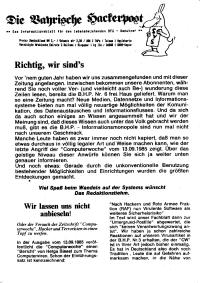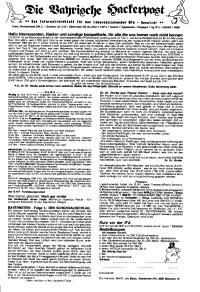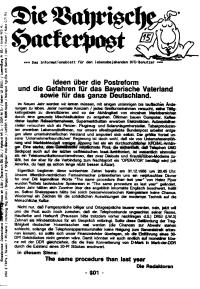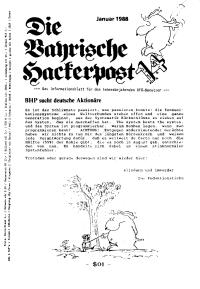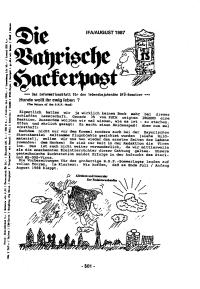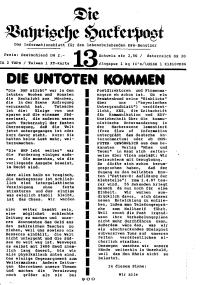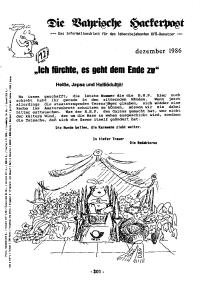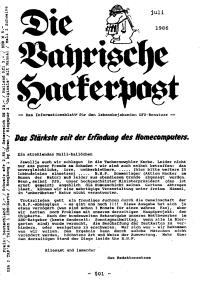Copy Link
Add to Bookmark
Report
Computer Undergroud Digest Vol. 06 Issue 72

Computer underground Digest Sun Aug 14, 1994 Volume 6 : Issue 72
ISSN 1004-042X
Editors: Jim Thomas and Gordon Meyer (TK0JUT2@NIU.BITNET)
Archivist: Brendan Kehoe
Retiring Shadow Archivist: Stanton McCandlish
Shadow-Archivists: Dan Carosone / Paul Southworth
Ralph Sims / Jyrki Kuoppala
Ian Dickinson
Copywrite Editor: Eatingin Shrdlu
CONTENTS, #6.72 (Sun, Aug 14, 1994)
File 1--Jacking in from the "The Good, the Bad and the Ugly" Port (Cyberwire)
File 2--Jacking in from the "Just Nationalize It" Port (Cyberwire)
File 3--Police Checkpoints on the Information Highway
File 4--CyberSpace Forum - ReIntroduction
File 5--"What Computers Still Can't Do" by Dreyfus (Book Review)
File 6--Essay Contest - Future of Print
File 7--GovAccess.043: ACT.ALERT! Two CRUCIAL ITEMS Aug.8th
Cu-Digest is a weekly electronic journal/newsletter. Subscriptions are
available at no cost electronically.
CuD is available as a Usenet newsgroup: comp.society.cu-digest
Or, to subscribe, send a one-line message: SUB CUDIGEST your name
Send it to LISTSERV@UIUCVMD.BITNET or LISTSERV@VMD.CSO.UIUC.EDU
The editors may be contacted by voice (815-753-0303), fax (815-753-6302)
or U.S. mail at: Jim Thomas, Department of Sociology, NIU, DeKalb, IL
60115, USA.
Issues of CuD can also be found in the Usenet comp.society.cu-digest
news group; on CompuServe in DL0 and DL4 of the IBMBBS SIG, DL1 of
LAWSIG, and DL1 of TELECOM; on GEnie in the PF*NPC RT
libraries and in the VIRUS/SECURITY library; from America Online in
the PC Telecom forum under "computing newsletters;"
On Delphi in the General Discussion database of the Internet SIG;
on RIPCO BBS (312) 528-5020 (and via Ripco on internet);
and on Rune Stone BBS (IIRGWHQ) (203) 832-8441.
CuD is also available via Fidonet File Request from
1:11/70; unlisted nodes and points welcome.
EUROPE: from the ComNet in LUXEMBOURG BBS (++352) 466893;
In ITALY: Bits against the Empire BBS: +39-461-980493
UNITED STATES: etext.archive.umich.edu (141.211.164.18) in /pub/CuD/
ftp.eff.org (192.88.144.4) in /pub/Publications/CuD
aql.gatech.edu (128.61.10.53) in /pub/eff/cud/
world.std.com in /src/wuarchive/doc/EFF/Publications/CuD/
uceng.uc.edu in /pub/wuarchive/doc/EFF/Publications/CuD/
wuarchive.wustl.edu in /doc/EFF/Publications/CuD/
EUROPE: nic.funet.fi in pub/doc/cud/ (Finland)
ftp.warwick.ac.uk in pub/cud/ (United Kingdom)
JAPAN: ftp.glocom.ac.jp /mirror/ftp.eff.org/
COMPUTER UNDERGROUND DIGEST is an open forum dedicated to sharing
information among computerists and to the presentation and debate of
diverse views. CuD material may be reprinted for non-profit as long
as the source is cited. Authors hold a presumptive copyright, and
they should be contacted for reprint permission. It is assumed that
non-personal mail to the moderators may be reprinted unless otherwise
specified. Readers are encouraged to submit reasoned articles
relating to computer culture and communication. Articles are
preferred to short responses. Please avoid quoting previous posts
unless absolutely necessary.
DISCLAIMER: The views represented herein do not necessarily represent
the views of the moderators. Digest contributors assume all
responsibility for ensuring that articles submitted do not
violate copyright protections.
----------------------------------------------------------------------
Date: 5 Aug 1994 11:18:07 -0500
From: Brock Meeks / CyberWire <brock@well.sf.ca.us>
Subject: File 1--Jacking in/"The Good, the Bad and the Ugly" Port (Cyberwire)
CyberWire Dispatch // Copyright (c) 1994 //
Jacking in from the "The Good, the Bad and the Ugly" Port:
Washington, DC -- For months now a kind of high stakes privacy poker has
been played out here behind the closed doors of congressional subcommittees
as the FBI, telephone industry executives, congressional staffers and civil
libertarians have played a kind of five card draw with the privacy of all
your future telephone calls, faxes and electronic mail.
The betting's all but over now; Congress has "called" the hand and laid
its cards on the table: A soon to be introduced bill that will mandate
--forever -- that all the nation's telephone networks be designed to give
the FBI easy wiretap access. The bill's sponsors, Senator Patrick Leahy
(D-Vt.) and Rep. Don Edwards (D- Cal.), have fought through a numbing array
of options, opinions and (FBI) obfuscation in order feel comfortable enough
to sign their names to a bill that, just years ago, was laughed off Capitol
Hill because it was severely flawed.
My how time changes things.
It's been two years since the FBI first introduced what amounted to an
"Easy Wiretap America" bill. Now we have a new President, a new FBI
director and suddenly, a new bill that requires the nation's
telecommunications providers to reengineer their facilities so the FBI can
do wiretaps easier.
The Leahy and Edwards staffs have dumped hundreds of hours of "sweat
equity" into this bill, which could be introduced as early as today
(Friday) but certainly before next Tuesday.
Leahy and Edwards have never been known to tape "kick me" signs on the back
of American privacy rights. The bill that's been hammered out here -- and
that phrase isn't used lightly -- by Leahy and Edwards is a damn sight
better than the FBI's laughable attempts at drafting legislation. In fact,
it was Leahy and Edwards that stepped into the breach to thwart those early
FBI proposals from being passed "as is."
An earlier version of this bill, which, among other things, gave the
Justice Department the right to shut down any telephone company's network,
regardless of size, if they didn't comply with the wiretap statute, was set
to be introduced by Sen. Joseph Biden (D-Del.), with heavy support from
others in congress. That bill, if introduced, would have passed,
congressional sources have said.
But the Leahy and Edwards tag team effort took Sen. Biden off the scent.
So, we get a more palatable bill. Call it the "cod liver oil act" of 1994.
It tastes horrible, but it's necessary, considering the earlier
alternatives. Without this Leahy/Edwards bill our privacy rights would
have really been fucked over. At least now we get kissed. (Sorry, no
tongues.)
Still Got The Power
====================
A draft copy of the latest bill, obtained by Dispatch, shows that the
Justice Department and FBI still have the tools to intimidate and harass
the future development of the nation's telecommunications infrastructure.
The bill, as it stands, does keep Justice and law enforcement from
mandating any "specific design of features or system configurations to be
adopted." But the requirements to build wiretap capability into all public
telecommunications carrier systems is steadfast. This means that while the
FBI can't expressly tell a company "how to get there," it can definitely
say, "just get there."
Never again, under the provisions of this bill, will a telecommunications
provider be able to develop a service or technology without first and
foremost asking the question: How can I design this so that it pops off
the assembly line wiretap ready?
Read it again. The key word there: Never.
There is an "out" however, and it comes thanks to Leahy. If a new
technology doesn't fit with the mandate, that is, if you can't make that
new hand held satellite phone wiretap ready and you've made every
"reasonable effort" to make it so, it can still be sold. How?
"The court can enforce the (wiretap) requirement of this act only if
compliance with the act is 'reasonably achievable' through the application
of 'available technology,'" said Jeff Ward, director of governmental affair
for the Nynex telephone company.
Ward -- who says the bill has been an "albatross" around his neck for 2
years -- has focused his efforts during this 2 year time frame, on ensuring
that such "reasonably achievable" provisions allow telephone industry and
equipment makers to be "good corporate citizens." That is, these
companies are required to consider [wiretap] design factors, but if after
"due consideration, we can't do it, we've got to be able to proceed."
This effort is supported by the bill; however, it is a court of law that
decides what is "reasonable" or not. Such litigation, brought by Justice
no doubt, could tie up a new technology for years while the case is
decided, thus giving Justice and the FBI a kind of de facto control over
the development of new technologies.
Make That Check Out To...
=========================
Then there's cost. The FBI insists that the cost to industry to retrofit
all their networks will be only $500 million. But that's a bullshit figure
and everyone from FBI Director Louis Freeh to the newest line programmer at
AT&T knows it.
In fact, so many lines of code will have to be written and maintained to
comply with these wiretap mandates that one Internet pioneer, Dave Farber,
has called the FBI proposal "the programmers full employment act."
Provisions in the bill make it basically a blank check for the FBI. Within
the first 4 years, there is $500 million approved to be spent on
"upgrading" all the nation's telephone systems to provide law enforcement
with easy wiretap access. There are provisions in the bill that require
the government to repay all costs of installing wiretap software throughout
all networks forever, with no cap. What's not clear, however, is what
happens when FBI demands for wiretap capability exceed the $500 million
mark (and it will) during those first 4 years.
Maybe we'll get some answers when this bill (in whatever language is
finally passed) is discussed at joint hearings to be held by Leahy and
Edwards on it August 11th.
Take It or Take It
===================
Take it or take it. Those are your only choices here. This bill is a slam
dunk for passage. But you didn't lose everything.
All electronic systems will be exempt from complying with the bill's
mandates. But hold on before you cheer...
This simply means that the FBI can't tap your Email from, say, America
Online's computers; rather, they can do what they've always been allowed
to do: Snag it off the telephone company's central switch. But at least
we don't have the Internet being hung with "FBI: Tap In Here" signs.
Transactional data, Dispatch has been told, will get some beefed up
protection. Just how this language shakes out remains to be seen, however.
Yeah, but Can They Count?
=========================
At the very end of the draft we obtained, the FBI is given a curious
additional reporting requirement under its annual wiretap reports. The
addition, in our draft copy, says the Bureau must quantify "the number of
interceptions encountering electronically encrypted communications,
specifying the number of such interceptions that could not be decrypted."
Throughout the history of this bill and the now ignominious Clipper Chip
proposal, the FBI has touted the fact that it's investigations are
continually stymied by encryption technologies. Small problem: The Bureau
refuses to provide any kind of documentation to back up those claims.
At first blush, then, this extra requirement finally means the G- men will
have to give us some concrete numbers. All well and good... *if* that's
what this requirement actually is used for.
There's potentially a much darker use for these stats... yes, I see all you
Crypto-rebels nodding your anxious heads. You see, such a formal gathering
of statistics could be used by the Bureau or... say, the National Security
Agency, to "prove" that private encryption schemes are just too great a
threat to "catching bad guys."
Citing these newly gathered statistics the White House could, one day,
order the banning of private encryption methods. Far fetched you say?
Yeah, it's far-fetched... something on the order of, oh, say a bill that
mandates telephone companies give the FBI easy access to all conversations
from now until forever.
Meeks out...
------------------------------
Date: Mon, 01 Aug 94 13:30:37 EDT
From: "W. K. (Bill) Gorman" <34AEJ7D@CMUVM.CSV.CMICH.EDU>
Subject: File 2--Jacking in from the "Just Nationalize It" Port (Cyberwire)
You might find this of interest.
>----------------------------Original message----------------------------
CyberWire Dispatch // Copyright (c) 1994 //
Jacking in from the "Just Nationalize It" Port:
Washington, DC -- The most recent draft of the FBI's digital
wiretap bill turns control of the nation's communications network
over to the Justice Department.
It's a twisted policy that, in essence, ponies up more than $500
million in an effort to nationalize all telephone and electronic
communications networks, a move that's unprecedented in U.S.
history. For although private companies retain control over
profits and revenues, this bill puts them at the technological beck
and call of the Justice Department. Think of it as Attorney
General Janet Reno moving her lips, but it's FBI Director Louis
Freeh making all the noise.
The July 19 draft of the FBI bill obtained by Dispatch, gives the
Justice Department the authority to make technological demands of
the nation's communications networks that must be complied with or
risk severe penalties.
However, the bill specifically states that law enforcement agencies
can't dictate a "specific design or system configurations," but
that's little comfort.
The bill gives the government the authority to dictate -- forever -
-specific capabilities each communications company has to met or be
held in contempt, forced to pay as much as $10,000 for every day
they can't met the government's demands of easy wiretap access to
their customer's conversations, electronic mail messages, faxes or
file transfers.
The draft also dramatically expands the scope of the bill, from
just "common carriers" (which are mainly your local and long
distance telephone companies) to a new category of
"telecommunications carriers."
This new category, penciled in at the insistence of the telephone
companies facing the threat of having to bear the entire burden for
making the FBI's job easier, includes "any person or entity engaged
in the transmission or switching of wire or electronic
communications for value for unaffiliated persons, but does not
include persons or entities engaged in providing information
services."
This means all networks, including the one that delivered this
Dispatch article to your electronic mailbox, will now have to be
"wiretap ready," according to FBI blueprints. The only companies
that escape are free BBSs and systems that must prove they are
information services rather than communications services. Just how
America Online, Prodigy and CompuServe will deal with this is
unknown, since systems like these split the fence between
information providers and communications facilitators.
If this bill is passed, the Attorney General has one year to draw
up its easy wiretap access battle plan and present it to the
industry. Included in that plan must be a written notice of the
maximum capacity required to "accommodate all the communications
interceptions, pen registers and trap and trace devices" the
Attorney General "estimates" the government will need.
All "telecommunications carriers" then have 3 years to comply with
those requests. The catch is, the Justice Department can
"periodically" provide updates to that original plan, which
"increases the maximum capacity" first stated. For each upgraded
estimate, the industry has 3 years to cooperate or get hammered.
If a carrier fails to comply, the Justice Department can order
compliance, up to and including ordering manufacturers to redesign
their products so they can be installed on U.S. communications
networks -- yes, that includes the amorphous Internet, at least on
the U.S. side. Noncompliance carries the possible fine of $10,000
per day. However, the current bill takes away the veritable
"Thor's Hammer" authority from Justice, that is, the ability to
shut down a carrier's network for not complying with the bill.
Standards? We Don't Need
No Stinking Standards
==========================
Just to make sure that all this "easy use wiretap" software gets
codified, there will be standards written. This means every public
telephone network and communications system, will, forever, now
come with built in eavesdropping capability, courtesy of Uncle Sam.
The bill doesn't actually demand that wiretap access be written
into the standards, but the sub-text of the bill clearly intends
for them to be there. "The absence of specifications or standards
for implementing" wiretap access won't be considered an excuse for
carriers to claim noncompliance, the bill says.
Enter the Federal Communications Commission. Under this bill, the
FCC is made out to be court of last resort for any wiretap
standards disputes. "[I]f industry associations or bodies fail to
issue specifications or standards, any person may petition" the FCC
to "establish... specifications or standards" that implement easy
wiretap access, the bill says.
In other words: If industry tanks on creating specs, Uncle Sam,
impersonating the above referenced "any person" will compel the FCC
to write the damn things. The FBI gets its wiretap software
written voluntarily or by force. They don't care which route they
have to take.
Of course, the FCC is woefully equipped to write standards; they
are enforcers after all of such standards, not creators of them.
So, in order to help out with this egregious task, the bill allows
the FCC to assess and collect fees that it will levy against
telecommunications carriers for, well, there's no nice way to say
this, doing their fucking job.
And get this, the FCC gets to use that penalty tax money to help it
pay for writing the wiretap rules. You gotta love these bill
writing wonks for creating: Self-help Agency Funding or "Bigger
Appropriations Through Fines."
The Bottom Line
==============
What's it going to cost to allow the FBI to eavesdrop from
virtually any "remote" location of their choice, as the bill
states? The first bite from the taxpayer wallet is a healthy $500
million in the first 3 years. (Remember, now, FBI Director Louis
Freeh, as late as last month, was on television telling the world
this electronic Trojan Horse would cost only $300 million.)
However, the bill contains a "blank check" clause, which allows the
government (Hint: This is really you and me) to continue paying
for upgrades to this wiretap software from 1999 "and thereafter" in
"such sums as may be necessary to carry out the purpose of this
act." You can thank the telephone companies for this clause.
Without the endless credit line, they said they would fight the
bill with all their resources. Now they'll just whimper a lot and
roll over.
Although the telephone still oppose the bill on principle -- they
just don't like the government telling them to do anything --
they're just happy not to have to pay for this themselves. As long
as every other telecommunications company gets stung and the
taxpayer foots the bill, well, hell, they can live with it.
Besides, they have bigger fish to fry, like squeezing Congress to
let them into the long distance market where they can really make
some coin.
So, what we get now from the telephone industry -- trust me on this
-- is token opposition to the FBI bill. "This thing is beginning
to smell like law," said a telephone company executive familiar
with his industries efforts on the bill. Dispatch suggested a more
colorful "smells like" phrase. The executive simply smiled.
All Said And Done
================
The bill, while not the final version, is "pretty damn close," a
congressional staffer said. The fight over language hasn't been
pretty and it's likely to continue to be ugly until the final bill
is submitted, which will be before the August recess. "We will
have a bill one way or another," another congressional staffer
said. The staffs of Senator Patrick Leahy (D-Vt.), Sen. Joe Biden
(D.-Del) and Rep. Don Edwards (D-Cal.) have all had a crack at
melding this bill.
EFF's been in there fighting, too. In fact, EFF's legislative
liaison cancelled a trip to Japan to stay and "fight" for better
language in the bill, according to a message he posted online.
If that's the case, someone needs to fight harder. There is,
however, some evidence of EFF's fingerprints on this bill.
The bill specifically states, for example that "any law enforcement
agency" is NOT authorized to "prohibit the adoption of any feature
or service by providers of wire or electronic communication
service." This means that if your "telecommunications provider"
provides some kind of encryption capability -- even non-government
approved encryption -- this bill doesn't force you to turn over the
encryption keys to the cops.
And in the area of transactional data, the bill limits the cops to
just getting your telephone number and address, without the ability
to scavenge through all your private transactions and billing
records. This ends the threat of the bill having the effect of
turning the telephone network into "a nationwide surveillance tool"
of the FBI, as EFF Executive Director Jerry Berman said previous
versions of the bill would allow.
Just remember, as this bill stands, the FBI bought your privacy
rights for a mere $500 million-plus. That cheap at twice the
price.
------------------------------
Date: Thu, 11 Aug 94 14:14 CDT
From: jdav@MCS.COM(James I. Davis)
Subject: File 3--Police Checkpoints on the Information Highway
POLICE CHECKPOINTS ON THE INFORMATION HIGHWAY
By Jim Davis
The so-called "electronic frontier" is quickly turning into an
electronic police state.
New computer technologies provide powerful tools for protecting
privacy and sharing information. To maintain control over the new
technology, information and the people who use it, the U.S.
government is clamping down on several fronts.
Here are a few recent developments:
-- The FBI wants to require all computer bulletin boards and
communications carriers and makers of electronic communications
equipment to give it a way to spy on everyone who communicates.
According to draft FBI standards recently obtained by the
Washington-based Electronic Privacy Information Center, "every
carrier must ensure that its equipment allows for interception of
a communication concurrent with a transmission and provide call
identifying information to a remote government facility.
"Manufacturers and support service providers must also assist by
developing equipment and software with these capabilities."
-- The federal government is pushing ahead with its so-called
"Clipper Proposal," a plan to subvert private communications.
New technologies allow people to code messages and conversations
so that they are virtually impossible for anyone except the
intended recipient to read. Even the government would have great
difficulty spying on such mail or conversations.
The government's proposal, designed with substantial assistance
from the National Security Agency, will require people to give the
government their secret keys to allow it to decipher messages
whenever a police agency wants.
-- The Commerce Department has recommended changes in the
copyright law that will outlaw the use of technologies that can
break "copy protection" schemes.
In today's economy, information products like music, videos and
computer software account for billions of dollars in business.
Industry associations like the Software Publishers Association
(SPA) want strict laws against unauthorized copying. Because
information is so easy to copy, enforcing copyright laws -- and
preventing people from getting access to culture unless they pay
for it -- will require a police state. The SPA already encourages
people to turn in co-workers who make unauthorized copies of
computer programs.
-- On July 28, a Memphis, Tennessee jury convicted a couple who
ran an adult computer bulletin board in California of 11 counts of
transmitting obscenity through interstate telephone lines.
A U.S. district attorney used conservative Tennessee "community
standards" against the couple because he was able to copy pictures
from the couple's computer, 2,000 miles and several states away.
With computer networks, what is legal in one state or country can
still be prosecuted in another place where that same activity is
illegal.
-- In late May, the White House announced plans to start a
nationwide system for delivering military pensions, food stamps,
Social Security and other public assistance electronically.
Instead of receiving a check, the recipient would receive an
"automated teller machine" card.
The system will extend government control over the lives of
everyone who receives government benefits, greatly increasing the
government's ability to monitor what they buy and where they buy
it.
The government claims that it needs these proposals to protect us
from drug dealers, child pornographers, welfare frauders and
terrorists. However, these proposals are giving the government the
ability to squelch any activity that it doesn't like or that
threatens the status quo.
Controlling citizens is becoming more necessary as the economy
worsens and money becomes harder to come by. The government wants
to use the technology to spy on its citizens. A better solution?
Putting technology to use for everyone.
For more information on privacy and civil liberties issues on the
information superhighway, contact these organizations:
Computer Professionals for Social Responsibility
P.O. Box 717
Palo Alto, California 94302
Phone: 415-322-3778
E-mail: cpsr@cpsr.org
Electronic Privacy Information Center
666 Pennsylvania Ave. S.E. #301
Washington, D.C. 20003
E-mail: info@epic.org
Electronic Frontier Foundation
1001 G St. N.W. Suite 950 East
Washington, D.C. 20001
Phone: 202-347-5400
E-mail: info@eff.org
******************************************************************
This article originated in the PEOPLE'S TRIBUNE (Online Edition),
Vol. 21 No. 33 / August 15, 1994; P.O. Box 3524, Chicago, IL 60654
For free electronic subscription, email: pt.dist-request@umich.edu
Feel free to reproduce; please include this message with
reproductions of this article.
------------------------------
Date: Sat, 13 Aug 1994 00:17:53 -0600 (MDT)
From: adunkin@NYX.CS.DU.EDU(Alan Dunkin)
Subject: File 4--CyberSpace Forum - ReIntroduction
(MODERATORS' NOTE: Alan Dunkin resumes his periodic commentary with
this issue. He's completed the gargantuan task of update the
CuD cummulative index through Vol. 5, which we'll run in about two
weeks).
THE CYBERSPACE FORUM - AUGUST 13, 1994
by Alan Dunkin [adunkin@nyx.cs.du.edu]
It's been awhile since I've written here last, because of work and
other problems I have been unable to contribute much of anything for
the past few months. Now that things have calmed down a bit, I can
now get back to doing what I had originally planned, making this a
regular feature of the Computer underground Digest.
One of the things I hope to provide is a list of new resources
available that may be of interest to you. The list may consist of a
listing of World Wide Web URLs; sites which, by the way, are growing
exponentially. Sites that are only accessible by telnet, FTP, or
other forms of connections will also be listed.
Another feature I hope to bring are the updates on some of the
texts I am working on. Constant readers of CuD know that I'm working
on the new volume of the cumulative index, and I would like to
announce that there will be a similiar index for EFFector, EFF's
newsletter that has been going on, in less quantity, since CuD's
inception. Yes, and there are other things in the works.
So, without further ado . . .
***
Estimated Times of Arrivals for the following projects:
Computer underground Digest Cumulative Index
[Volumes 1 through 5] - Right about now
EFFector Cumulative Index
[Volumes 1 through 6] - About three weeks
The CuD Index will be posted here first, and the EFFector Index will
be put straight in the EFF archives.
***
Those of you interested in cryptography, encryption, Clipper,
cypherpunks, PGP public key databases, may want to stop by
Fran Litterio's Cryptography, PGP, and Your Privacy WWW page.
It contains links to cryptography-related FAQs, information on
PGP version 2.6
As you may guess there's bunch of stuff there, and Fran has done
a really good job getting everything together and organized. You
can visit seperate sections on PGP, articles about or by cypherpunks,
newsgroups related to cryptography, more papers on various topics, and
even more than that.
The URL is http://draco.centerline.com:8080/~franl/crypto.html
***
That's about it for now. Look for the new CuD Cumulative Index
in your mailbox or at the EFF site, or it's mirrors within the next
few days.
Next time, a look into the early life of CuD and a few views of the
Amateur Access BBS case decision. And hopefully the time lag between
the forum issues will be a few months less :)
------------------------------
Date: Thu, 11 Aug 1994 13:33:09 -0600 (MDT)
From: "Rob Slade, Ed. DECrypt & ComNet, VARUG rep, 604-984-4067"
Subject: File 5--"What Computers Still Can't Do" by Dreyfus (Book Review)
The MIT Press
55 Hayward Street
Cambridge, MA 02142-1399
USA
Robert V. Prior, Editor - Computer Science prior@mitvma.mit.edu
Maureen Curtin, Int'l Promo. - curtin@mit.edu
"What Computers Still Can't Do", Dreyfus, 1992, 0-262-54067-3, U$13.95
There are two kinds of classics. In one, an important idea is held
up, explained and illuminated from all sides. This exposure is both
pleasurable and thought-provoking; so much so, that even an opponent
of the central thesis still enjoys the work and may be inspired by it.
The second type of classic takes an important idea and beats it to
death. This is what Dreyfus did with his original work, which is
basically unchanged here. One suspects that his work would not have
produced such animosity had he not taken the tactic of a direct attack
on all of the major artificial intelligence work of the time. (And of
the time since: the introductions to the various reprintings continue
attacks on each succeeding generation of AI.) After a while, even the
most sympathetic reader starts to respond, "So it's limited. So it
doesn't work yet. So what?"
That, however, only applies to the introductions, and part one. Parts
two and three move completely out of the technical realm and into the
philosophical. The second part looks at the philosophical beliefs of
the devotees of AI. "Belief" is the correct term. As Dreyfus points
out at the beginning of part three, committed workers in the field of
artificial intelligence seem to have, consciously or unconsciously, an
almost religious assumption that man, and the brain, is a calculating
device of some kind. Dreyfus points out that these beliefs are
unfounded, in the sense of not being based upon clearly demonstrable
evidence or principles.
However, as one moves into the last part of the book, it becomes
evident that Dreyfus is *not* presenting a critique of artificial
reason or intelligence. He is primarily attacking "cognitive
simulation". Part three presents an alternative view, not of
computing or AI, but of cognition. Unfortunately, this part of the
book, while somewhat interesting, is not as compelling as the negative
parts.
The central thesis of the book, that there are limits to computing and
that we tend to hold unquestioned beliefs about computing power, is
still an important one. The failure, however, to update the book in
terms of current beliefs and aspirations, robs the work of some
impact.
copyright Robert M. Slade, 1994 BKWCSCD.RVW 940519
======================
DECUS Canada Communications, Desktop, Education and Security group
newsletters Editor and/or reviewer ROBERTS@decus.ca, RSlade@sfu.ca,
Rob Slade at 1:153/733 DECUS Symposium '95, Toronto, ON, February
13-17, 1995, contact: rulag@decus.ca
Date: Sun, 07 Aug 94 18:07:24 EDT
From: AdamRCohen@AOL.COM
Subject: File 6--Essay Contest - Future of Print
I thought you might like to hear about an essay contest sponsored by
the Audit Bureau of Circulations. The subject is, "Print: Roadkill on
the Information Superhighway - Yes or No?" Top prize is $2,500. Essays
are due 9/7/94.
Basic information about eligibility and the Audit Bureau follows. For
more complete information and entry forms, call ABC's Colleen O'Grady
at 708-605-0909. Please share this notice with anyone who might be
interested. Many thanks.
Entry Requirements: Entrants must be employees of ABC-member companies
and have worked in the advertising, marketing or publishing industries
for 5 years or less as of 9/7/94. Over 4,000 publishers, advertisers
and ad agencies are members of ABC. To verify your eligibility, call
Ms. O'Grady at 708-605-0909.
The Audit Bureau of Circulations is the first and largest
circulation-auditing organization in the world. ABC establishes ground
rules for circulation auditing and provides buyers and sellers of
print advertising with independent verfication of the circulation
information needed to make well-informed media decisions.
Adam R. Cohen
Member, ABC Young Media Professionals Committee
AdamRCohen@aol.com
------------------------------
Date: Thu, 4 Aug 1994 10:03:08 -0700
From: Jim Warren <jwarren@WELL.SF.CA.US>
Subject: File 7--GovAccess.043: ACT.ALERT! Two CRUCIAL ITEMS Aug.8th
Aug.04, 1994
I *think* I have *finally* purged the GovAccess list of those who do not
wish to continue to receive these postings. If not, flame me one more time.]
&&&&&&&&&&&&&&&&&&&&
Fact: California legislators consider 10 to 15 letters and faxes to be a
*strong* showing of support for a bill (in a state of 31-million population!).
One of the worst things about democracy is that citizens must occasionally
*act* to inform their representatives of their desires. :-) These are two
such instances.
&&&&&&&&&&&&&&&&&&&&
CRUCIAL VOTE ON MONDAY: PRECEDENT-SETTING EXECUTIVE-BRANCH ONLINE ACCESS
Last year, AB 1624 opened California's legislative-branch info to free
public access, online - a model now being pursued in perhaps a dozen other
state legislatures. Now, we're afer the executive-branch.
On Monday, Aug. 8, California's Assembly Bill 2451 (AB 2451) by
Assemblyman Tom Bates will face a crucial vote in the Senate
Appropriations Committee.
AB 2451 passed the California Assembly unanimously (to my amazement), but
some inside sources say it may have trouble in the Senate.
*Faxed support letters are needed immediately!* <===!!
And ... letters arriving on Monday will probably be useless!
This bill would require that already-computerized state information, that
is already public information under the California Public Records Act,
be made available to the public via the Internet, without charges by the
state. (Implementation is contingent on fetching-back some loot from the
federal government to cover costs, but fed "information infrastructure"
grants are already splattering around.)
Online access to state-agency public records would greatly aid business,
help local government to be more efficient, and permit a better-informed
citizenship.
Letters should be *short*, polite and to the point. (And, if there is
state agency or regulatory information that could be helpful in your
business or work, it's especially valuable to mention it.)
Even if you've written a letter before, supporting this bill, PLEASE WRITE
AGAIN (these new players need to know you're still interested -- and
watching!).
Our new targets: Senate Appropriations Committee (and their fax numbers)
Bob Presley, Chairman (D-Riverside) 916-445-9781 (voice only; no fax?!)
Bob Beverly, Vice Chairman (R-Redondo Beach) 310-540-2192
Marian Bergeson (R-Newport Beach) 916-445-9263
David Kelley (R-San Diego) 916-327-2187
Bill Leonard (R-Upland) 916-327-2272
Alfred Alquist (D-San Jose) 916-323-8386
Ralph Dills (D-Gardena) 916-323-6056
Leroy Greene (D-Sacramento) 916-327-6341
Patrick Johnston (D-Stockton) 916-327-4213
Henry Mello (D-Gilroy) 916-448-0175
Art Torres (D-LA) 916-444-0581
Diane Watson (D-LA) 916-327-2599
Also, be sure to fax a copy of your letter to bill-author Bates' office
at 916-445-6434.
(His aide is Rachel Richman, rrichman@igc.apc.org, but the emerging reality
is that emailed support letters are proving *NOT* to be very persuasive when
shown to fence-sitting committee members - "They all look alike." The
mummies in the legislature still need to see things that *look* like
letters or faxed-letters! <blegh!>)
If you care enough ... send the very best! :-)
And email this to all your friends und associates. Pronto!
&&&&&&&&&&&&&&&&&&&&
STILL TRYING TO GET CAMPAIGN-FINANCE DISCLOSURES ONLINE (Senate Bill 758)
Another crucial precedent-setter - if we can get it passed (and this
election-year is the time to do it!) - is Senator Tom Hayden's SB 758. It
would require candidates and campaign committees receiving significant
loot to file their public disclosures in computerized form (cheap! fast!),
and would make the info freely available via the Internet.
It's stuck in the Assembly Elections Committee, but can be reconsidered *IF*
the committee Chairwoiman permits it - *soon*! There are some powerful
insiders working on it, so it has a reasonable chance - *if* there's
evidence of public interest.
A fax to her as soon as possible can help pry SB 758 out of her committee,
so it could still be passed in this session.
Short, polite faxes advocating reconsideration of SB 758 (with a few
reasons why it's important that citizens have *modern* access to these
public disclosures) are needed, NOW!, to:
Chairwoman Diane Martinez, fax/916-324-1393 (D-East Los Angeles)
with a copy to bill-author Tom Hayden, fax/916-324-4823.
And tell your friends!
&&&&&&&&&&&&&&&&&&&&
ERRATA: TWO GovAccess.041's <tsk!>
On June 11th, I exuded #041 concerning the Peninsula CivicNet Symposium.
On June 29th, I sent another #041, having nothing to do with civic
networking; entirely-concerned with California's computerized campaign-finance
disclosures. Please consider it GovAccess.042.
Hot dang! I neu I'd mak a misteak somedae.
&&&&&&&&&&&&&&&&&&&&
"If a Nation expects to be ignorant and free in a state of civilization,
it expects what never was and never will be. ... If we are to guard against
ignorance and remain free, it is the responsibility of every American to be
informed." -- Thomas Jefferson from Chris Casey, Sen. Ted Kennedy's staff]
------------------------------
End of Computer Underground Digest #6.72
************************************









